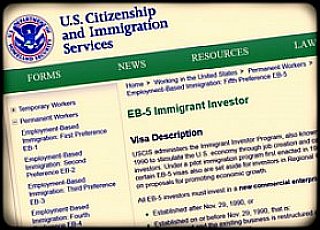
In the good old days, immigration policy was made through hearings and floor votes; now it is often made by “riders” on other legislation. With that in mind:
- I am told, on excellent authority, that the $1 trillion infrastructure bill, the forerunner of a larger one, still has no EB-5 elements in at as of August 10, even though the Senate has been dealing with amendments to it for several days. An earlier version of the bill, the result of extended bipartisan bargaining, was similarly EB-5-free. The senators, because of the filibuster, however, have allowed illegal aliens to work on these infrastructure projects by failing to mandate use of E-Verify by recipients of infrastructure funds.
- There is good cause to worry that the soon-coming reconciliation bill will carry a provision granting additional legal status to the so-called “Dreamers”, aliens now up to their middle 30s, who arrived illegally before age 16.
The main part of the EB-5 program for immigrant investors has been dead for 40 days and 40 nights, since the Senate failed to renew the authorization for the use of pooled alien investments through the regional centers, as we reported earlier.
In prior days, an alien investor could put $500,000 into a Homeland Security-approved project and get a family-size bunch of green cards. Later, the $500,000 minimum was raised to $900,000, and then dropped back to $500,000 by a civil servant sitting in for a federal judge.
Recently, EB-5 boosters have been writing about a related bit of legislation as a possible alternative to the program; I find it reassuring that the program’s dwindling fan base is thinking in those terms. In the most recent blog post from EB-5 Investors Magazine we read about the “Let Immigrants Kickstart Employment (LIKE) Act, [which] may be an alternate visa program to the EB-5 investor program. If passed, the LIKE Act encourages the establishment of start-up companies in the U.S. to spur economic growth and create jobs.”
There is a huge difference between the main part of EB-5 and the proposed LIKE Act. In the former, a passive investor could simply buy his or her way into legal status in the U.S. In the LIKE Act scenario, the alien has to actually start a company in the U.S. It would produce a totally different set of beneficiaries. I find it hard to believe that the shrinking number of EB-5 regional centers could find much use for a LIKE Act.
Albany. While governors do not play a major role in migration matters, they can act to encourage or discourage benefits for illegal aliens in their states. Gov. Andrew Cuomo of New York announced his resignation today, August 10, in the wake of multiple sexual harassment charges; he had been following the Democratic Party’s recent line on immigration issues.
Lt. Gov. Kathy Hochul will succeed him. She's from Erie County in the far western part of the state, an area that is politically more like the Midwest than Brooklyn or Manhattan. Buffalo, after all, like Chicago and Cleveland, is on one of the Great Lakes.
Hochul served for a year and a half in the House of Representatives, from the summer of 2011 to January 2013, and during this time she secured a grade of C- in NumbersUSA’s immigration-reduction ratings, while her percentage of such votes was only 36 percent, that was 30 or more points better than her colleagues from the City of New York, most of whom get F- grades.
Will she remain a centrist on these issues facing a state-wide constituency? Good question.
